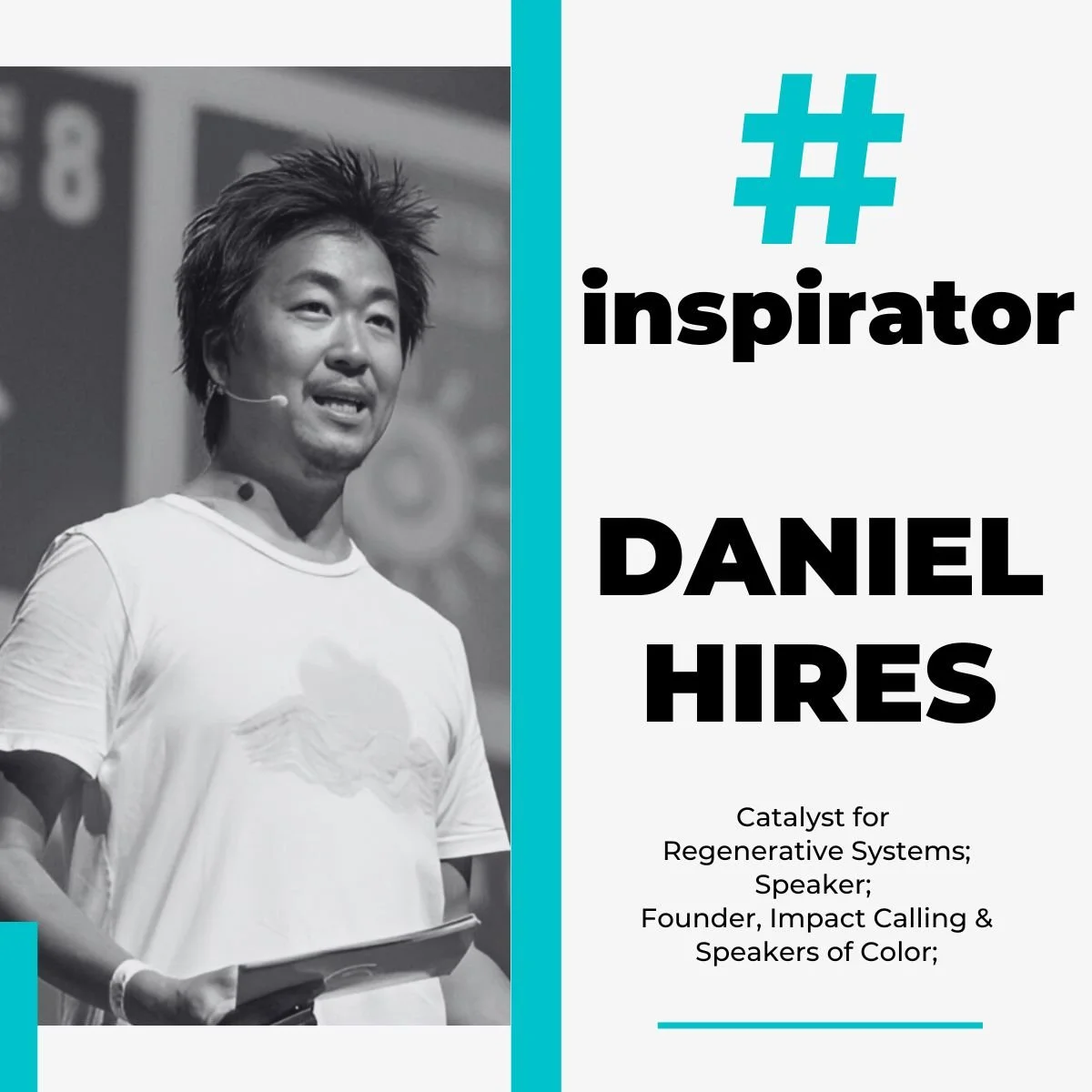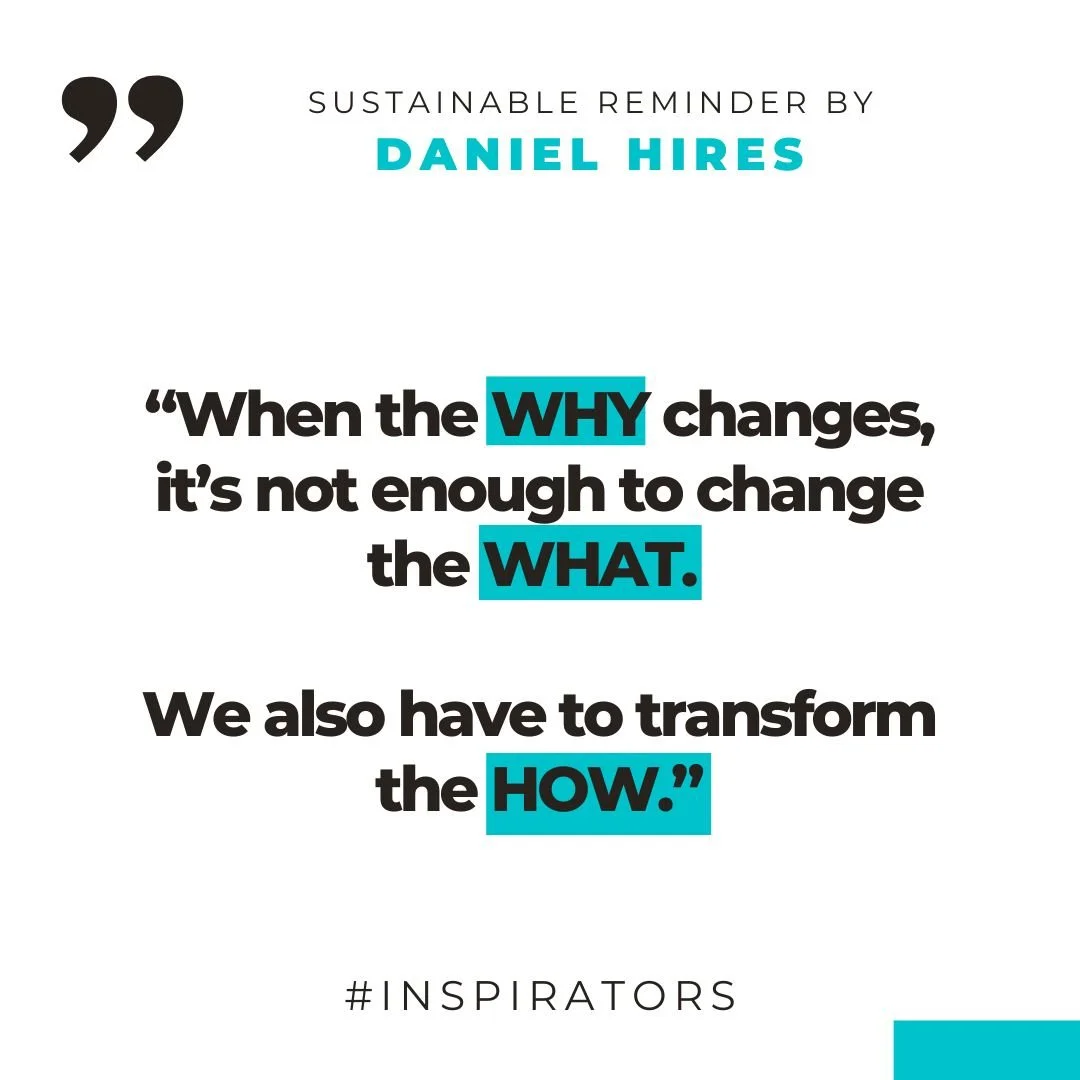Daniel Hires
on Inner Change for Systems Transformation
“I wasn’t supposed to be here.”
Not something you hear every day! But this is how Daniel R.’s story began in the unlikeliest of ways.
“A few days after I was born, I was left on a doorstep in South Korea. I was adopted and grew up as a third-culture kid between Germany and the US. This unlikely journey gave me a sense of gratitude and a desire to use this wild and precious life to contribute to a bright future.”
Daniel R. Hires learned to hold that responsibility lightly, to avoid the ego trap of trying to ‘save the world,’ which can so easily become “a burden instead of a driver.” The spark came when, as a student, he stumbled upon Yann Arthus-Bertrand’s Earth from Above exhibition. His love for the planet deepened, and a magnetic pull towards human impact drew him from sustainability into social innovation and climate activism. At COP21, a banner stopped him to reflect: “We’re not defending nature. We’re nature defending itself.” That reframing set him on a new course, introducing him to systems thinking, alternative economics, and deep ecology. His curiosity is shaped by a desire to “explore the edges where worlds meet, clash, and negotiate, and new possibilities emerge.” It's how he discovered Living Systems Innovation: a practical, nature-inspired framework for navigating change and renewal.
Daniel is now an impact entrepreneur, innovator, and facilitator of transformation, working with boards and leaders worldwide while building platforms like Speakers of Color to amplify underrepresented voices. He's also the founder of Impact Calling, supporting mission-driven teams when conventional approaches to innovation and change no longer work. Daniel was the first CMO of the Inner Development Goals, where he played a great role in scaling the initiative into a global reference point for the inner dimension of change, from the White House to the Vatican. He's still an IDG Ambassador, holding firm to the belief that systems change requires inner work: “We change systems by changing relationships. Transformation comes when we shift how we relate to our fellow humans, when we expand our sense of who belongs in the ‘we,’ and become aware of who we ‘other.’”
For Daniel, regeneration means shifting from fixing problems to feeding life: “Go where you come alive. The best events are the ones small enough that you keep bumping into the same people. That’s where relationships deepen and real co-creation begins. The unit of change is not the individual.”
Read his answers for Inspirators and tune into his resilient joy: “Optimism isn’t blind faith. It’s trusting that breakdowns and breakthroughs are part of the same process. Painful, yes! But the cracks also allow new possibilities to take root. Like imaginal cells reconfiguring in the chrysalis into a butterfly.”
Thank you, Daniel, for being an Inner Change Ambassador!
#INSPIRATORS QUESTIONNAIRE
Name: Daniel Hires
Company / Institution: Impact Calling | Speakers of Color
Title: Founder | Speaker | Catalyst for Regenerative Systems
Website: impactcalling.com | speakersofcolor.org | daniel.eco
LinkedIn profile: linkedin.com/in/hiresd
Country of origin: South Korea | Germany
Country you currently live in: Spain
Your definition of Regeneration: Regeneration is shifting from fixing problems to feeding life. If sustainability is about doing less harm, regeneration is about creating the conditions for more life to thrive.
Main business challenge you face: With Impact Calling, we step in when mission-driven businesses face challenges that are beyond conventional solutions - when complexity overwhelms, trust has eroded, or the path forward feels unclear. Our role is to reframe, reconnect, and find bold but realistic steps forward.
My own biggest challenge is supporting innovations that help us see the world differently, rather than reinforcing our old patterns.
Main driver that keeps you going: I wasn’t supposed to be here. A few days after I was born, I was left on a doorstep in South Korea. I was adopted and then grew up as a third-culture kid between Germany and the United States. To me, this unlikely journey has given me a deep sense of gratitude and desire to use this wild and precious life to contribute to a brighter future.
At the same time, I’ve learned to hold it lightly - to avoid the ego trap of trying to ‘save the world,’ which is eventually a burden instead of a driver.
The trait you are most proud of in yourself: Adaptability – growing up between cultures was a good training in navigating new contexts.
The trait you most value in others: Wisdom. Truly wise people balance courage with humility, intellect with empathy. A rare and precious balance.
Passions & little things that bring you joy: Seeing my daughter grow into her power is the most amazing journey. I love hosting, and spending quality time with friends. Increasingly in nature, too – I’m currently infatuated with the Deep Time Walk format. I love biking, and when I travel, exploring a new city by bike is always a highlight.
The Inspirators who determined you to take the regenerative path: As a student in 2005, I stumbled upon Yann Arthus-Bertrand’s Earth from Above exhibit in London. That sparked my love for the planet and concern for human impact, which eventually took me from sustainability to social innovation to climate activism.
A decade later, at COP21 in Paris, something clicked when I saw the signs that read: “We’re not defending nature. We’re nature defending itself.” That reframing set me off on a path into systems thinking, alternative economics, permaculture, and deep ecology.
A starting point for companies or professionals that are beginning the regeneration journey: I ask companies to start with two questions: Who are you truly in service of? And why do you want to go on this journey?
The first clarifies boundaries and gives the frame for creativity to flourish. The second provides the anchor when things get difficult. From there, it’s about exploring how the core business can contribute to life, not just reduce harm.
Sustainability work often focuses on what we need less of. I like to flip the question: What is really worth sustaining? What do we need more of? And how can you or your company be in service to that?
Most used and abused clichés in sustainability that bother you: Doing well by doing good. Too often it’s greenwash in disguise, a way of making business-as-usual sound virtuous.
An honest piece of advice for young people who lose hope: Your difficult feelings are valid. They might even be pointing you towards something that matters. As Jiddu Krishnamurti said: It is no measure of health to be well-adjusted to a profoundly sick society.
And don’t forget: A year before Rosa Parks refused to give up her seat, change seemed impossible. Then it became inevitable. She didn’t act alone, she was part of something. Find your people. Shared action builds hope.
Books that had a great impact on you / Must-Reads for any regenerative professional:
A great read to get started: Designing Regenerative Cultures by Daniel Christian Wahl.
Near and dear to my heart: Ishmael by Daniel Quinn.
Movies / Documentaries you would watch all over again: Of the movies I am currently watching over and over again, I enjoy Ratatouille the most.
Websites / Podcasts you visit frequently:
Recent obsession: Trevor Noah’s What now?
Nate Hagens’ The Great Simplification
Rachel Donald’s Planet Critical
Music that makes you (and your heart) sing: These days, it’s whatever lets my daughter and I have fun together!
I used to book concerts in the US, and I organized a silent disco parade/demonstration in Berlin, so I’ve learned to appreciate all kinds of styles. On my own, I go back to my roots - guitars, distortion, and something between punk, rock, and metal.
Places you travelled to that left a mark on you:
Two months in rural Madhya Pradesh, India – heat and monsoon etched into memory.
The Fushimi Inari Shrine in Japan at dusk – pure magic.
Berlin – simply always in my heart.
Global Regenerative Voices you recommend us to follow:
Vandana Shiva was an early influence, and the late Joanna Macy added great richness to my relationship with nature.
At the same time, I’m mindful of how easy we fall into the celebrity trope. I’m greatly inspired by the hands-on doers in the field – people like:
Laura Storm
Ernesto van Peborgh
Stephanie Rearick
Lana Jelenev
Jay Cousins
Viliana Dzhartova
Adnane Addioui
Wakanyi Hoffman
Phoebe Tickell
Fabian Pfortmüller
Monika Jiang
Guglielmo Apolloni
Francesca Pick
Matthias Scheffelmeier...to name just a few.
And speaking as an EU citizen in 2025, Francesca Albanese.
Trends in Regeneration we should keep an eye on:
Nature finance is a big one – but it depends: Will it become another speculative asset class, or evolve into living agreements between stewards and investors, rooted in care and reciprocity? This could push us to a world where ‘value’ is no longer defined by scarcity, but by aliveness.
Also, generally anything Indy Johar at Dark Matter Labs is working on.
And finally, many are starting to see that regeneration not as a 100-year project, but a 10,000-year one. What if our task as good ancestors may simply be to break cycles of harm so future generations can live in right relationship with life?
Events we should attend / Best places for networking (online or offline): Go where you come alive. For me, the best events aren’t the biggest - they’re the ones small enough that you keep bumping into the same people. That’s where relationships deepen and real co-creation begins. The unit of change is not the individual.
Associations, business clubs, tribes you belong to – and why: As former CMO of the Inner Development Goals (IDG), I still serve as an advisor and IDG Ambassador because I believe that systems change needs inner work. This awareness I also find in the weaving work at the BMW Foundation, where I’m a Responsible Leader.
I’m a Fellow of the Royal Society of Arts because of the interesting conversations around design, social innovation and the future. Finally, I recently started the Speakers of Color platform, which is turning into a self-empowering tribe for voices from the global majority.
Impactful and relevant Sustainable Development or Regeneration courses or certifications: I’ve been contributing to this course on Impact Experience Design (IXD): To me, IXD is all about shaping experiences of relating - to ourselves, to each other, and to the world. And that I believe, is fertile ground for change.
Reasons to feel optimistic about our future in 2030: Optimism isn’t blind faith. It’s trusting that breakdowns and breakthroughs are part of the same process. Painful, yes, but the cracks also allow new possibilities to take root. Like imaginal cells reconfiguring in the chrysalis into a butterfly.
Reasons to feel pessimistic about our future in 2030: It’s only 5 years away, we’ve crossed seven of nine planetary boundaries, and humans are notoriously bad at understanding exponential change.
Regenerative Leadership qualities much needed today: Resilience and courage. To face what’s difficult but necessary, not just what’s easy.
The Inspirator(s) you are endorsing for a future edition:
I’d be curious to read from Bayo Akomolafe.
And Stephanie Rearick, whose work on mutual aid networks is rarely spotlighted, but shows what economic alternatives could look like.
The quote that inspires you:
”Utopia is on the horizon. I move two steps closer; it moves two steps further away. I walk another ten steps and the horizon runs ten steps further away. As much as I may walk, I'll never reach it. So what's the point of utopia? The point is this: to keep walking.” (Eduardo Galeano)
Your quote that will inspire us:



